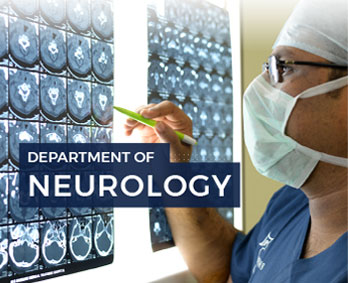
Neurology is a branch of Medicine that deals with disorders of the nervous system. It deals with the diagnosis and treatment of all categories of conditions and diseases involving the central and peripheral nervous system, including their coverings, blood vessels, and all effector tissue, such as muscle.
- The department collaborates with Neurosurgery and uses an integrative approach to training. At the undergraduate level, the subject is a part of General Medicine.
- Neurologists may also be involved in clinical research and clinical trials as well as basic research and translational research.
- Undergraduates learn about the more common neurological conditions like headaches. The MD residents learn through assisting, practicing and get teaching experience, when they run ‘clinics’.
- The department has a highly advanced Neurophysiology lab where procedures such as ECG and EMG are done. The department also has a dedicated Neurology ICU and a department-specific OT.
Some of the conditions Neurologists encounter are –
- Headache disorders such as migraines and tension induced headaches.
- Episodic conditions like seizures and epilepsies.
- Neurodegenerative disorders, the most common of which is dementia including Alzheimer’s disease.
- Cerebrovascular disease, such as transient ischemic attack, and strokes.
- Cerebral palsy
- Infections of the central nervous system (encephalitis), brain coverings (meningitis) and peripheral nerves such as herpes.
- Neoplasms – tumors of the brain and its envelopes (brain tumors), spinal cord tumors, tumors of the peripheral nerves (neuroma).
- Movement disorders such as Parkinson’s disease, chorea, hemiballismus, tic disorder, and Gilles de la Tourette syndrome.
- Traumatic injuries to the brain spinal cord and peripheral nerves.
FACULTY
-
Dr Mahendra J V
Professor & HOD
-
Dr. P T Acharya
Professor
-
Dr. Anish Mehta
Associate Professor
-
Dr. Pradeep R.
Associate Professor
-
Dr.Divya Nagabushana
Assistant Professor
-
Dr Lakshmi Priya
Assistant Professor



